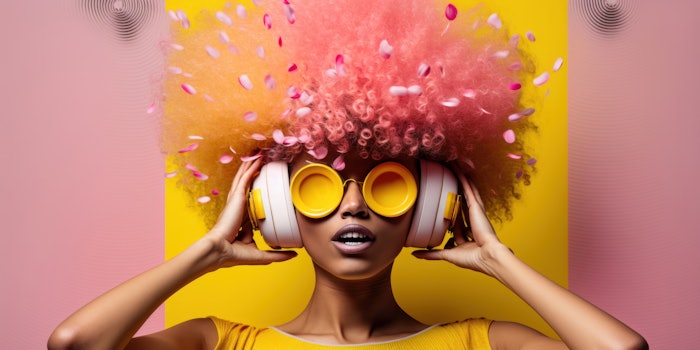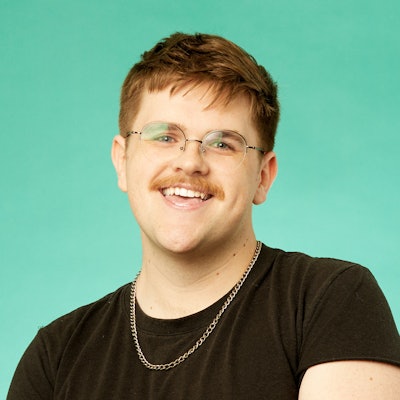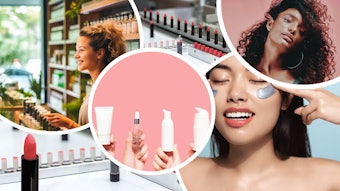
The world of advertising, especially when it comes to beauty, has always been a creative industry. However, generative AI, including ChatGPT, is set to become one of the most transformative forces in the marketing industry, changing how we create content, write copy and design campaigns. As the biggest emerging technology in the beauty industry, creative teams are reckoning with the extra-large elephant in the room: How will generative AI change marketing?
Generative AI technologies, with their remarkable capabilities for data analysis, content synthesis and editorial design, are revolutionizing the industry. However, while these technologies offer immense potential, marketers must strike a delicate balance when it comes to integrating AI beauty trends. As formulaic content becomes increasingly visible across social media platforms, marketing teams must continuously strive to encourage creative risks and original, customized work.
As the potential hazards of over-reliance on generative AI become apparent, it is clear that marketers need to strike the right balance between exploring new approaches to audience engagement and nurturing human creativity. Artificial intelligence in the beauty industry can serve as an invaluable early resource or brainstorming tool, but its limitations must be acknowledged and managed effectively.
The Positive Possibilities of Generative AI
Despite these considerations, there are positive possibilities associated with generative AI in beauty marketing. As a rapid data analysis and content generation tool, generative AI can swiftly produce short, effective copy and summarize lengthy case studies. Additionally, it offers the potential for search engine optimization and data-driven insights, helping to enhance conversion rates and guide customers toward new products and brands. By leveraging generative AI, beauty marketers can increase productivity, freeing up valuable time for creative endeavors.
The Creative Limitations of Generative Content
Though generative AI technologies offer undeniable advantages, beauty marketers must exercise caution and avoid relying solely on AI-generated content. AI may struggle to capture the full impact of pop culture and the ever-changing language of social media, both of which are vital in the dynamic landscape of the beauty industry. In an era dominated by platforms like TikTok and Instagram, where trends and video challenges swiftly come and go, the nuanced understanding of trending language requires the emotional intelligence and responsiveness of the human brain, something that AI might not achieve within the same timeframe.
The personal touch, creativity and imaginative thinking humans bring to the table are irreplaceable for brands seeking success. While AI possesses advanced technical knowledge, it can never fully replicate the power of human imagination. Engaging with target audiences is both a skill and an art form, honed through years of experience and understanding.
Companies must recognize the immense value and expertise of their human team members when considering how to use chat GPT for marketing purposes. Finding the right balance between AI-driven insights and human creativity is the key to achieving authentic and impactful connections with audiences.
Being Aware of Ethical Concerns
It is essential for beauty marketers to be aware of the risks and ethical concerns associated with AI-generated content. AI tools can introduce biases, generate discriminatory or misleading content, and even lead to unintentional plagiarism. Marketers must remain vigilant in evaluating the output provided by AI tools and take measures to mitigate risks. Offering training sessions, and yes, even legal briefings to creative teams, will become just one more aspect of incorporating generative AI in the corporate world.
Similarly, recent developments in AI have raised serious concerns about data privacy and the possibilities for fraudulent content and deception due to the vast amounts of data collected through web scraping. When using generative AI, sources need to be checked and statistics carefully confirmed to ensure that biases, offensive content, and incorrect information are not shared with clients and consumers.
Recently, a Guardian journalist realized that an article they never remembered writing had shown up in Google searches under their byline. The culprit to this web of misinformation? A clever generative AI had created the article, perfectly mimicking the journalist’s style. The result for writers and content creators everywhere? Check everything before hitting publish.
Leveraging Generative AI’s Potential
As businesses begin to embrace generative AI and content creation, many companies wonder how AI and its powerful capabilities will influence the future of beauty marketing. While the answer to that question is incredibly complex, especially as we have yet to see how AI will evolve over the next few years, here are four possible changes to marketing standards that teams must consider:
1. Ease of production
One of the most notable benefits of generative AI in beauty marketing is the expedited production of content. With the ability to generate precise visual and copy inspiration instantly, beauty marketers can streamline their content creation processes.
2. Copy length
In the age of short attention spans and information overload, concise and impactful copy will become the standard. Marketers can craft compelling messages that capture attention and drive engagement by focusing on words that truly do the work and resonate with their target audiences.
3. The importance of KPIs
With AI’s ability to synthesize analyses quickly, key performance indicators must become more concrete and reliable, offering marketers definitive measures of successes, risks and effectiveness.
4. Avoiding homogenization
However, there is also a risk of homogenization within the industry, as data-driven creation may overlook the importance of personalized experiences for diverse audiences. Striking a balance between data insights and human creativity will be vital in maintaining brand authenticity and consumer connection.
Generative AI technologies like ChatGPT have the potential to revolutionize beauty marketing by expediting content creation, enhancing productivity, and providing tailored marketing strategies. However, beauty marketers must be aware of the risks if they’re going to successfully integrate generative content. For beauty brands worldwide, the future of beauty marketing lies in a harmonious integration of AI tools and human ingenuity.
 Evan Pyle.
Evan Pyle.
Based in New York City, Evan Pyle is the writer and copy expert for Front Row, after previously working for content marketing expert Taylor & Pond Digital Marketing Agency. Motivated by creativity and a passion for writing that engages others, Evan’s words have helped to elevate the voices of many prestige beauty, lifestyle, and wellness brands, as well as Taylor & Pond’s blog presence. Forward-thinking, confident, and culturally savvy, Evan is a natural-born storyteller ready to connect with and develop others’ voices.










